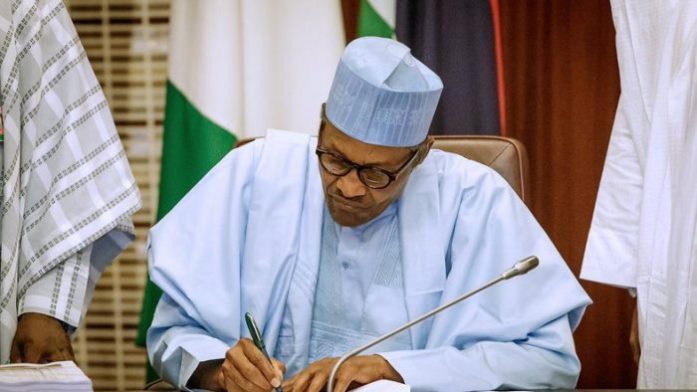President Muhammadu Buhari has signed the 2019 finance bill into law in Abuja on Monday.
The bill was submitted to the National Assembly alongside the budget but the bill signing is coming 27 days after the 2020 budget was signed into law on December 17.

“I am pleased to announce that this morning I signed into law the Finance Bill, 2019,” a tweet on the President’s Twitter account read.
“We introduced the bill alongside the 2020 budget, to reform Nigeria’s tax laws to align with global best practices, support MSMEs in line with our Ease of Doing Business Reforms, incentivize investments in infrastructure and capital markets and raise government revenues.”
"This is the first time, since the return of democracy in 1999, that a Federal Budget is being accompanied by the passage of a Finance Bill specially designed to support its implementation, and to create a truly enabling environment for business and investment by the private sector."
"I thank the leadership and members of the Ninth National Assembly for the hard work and support that have gone into the passage of the landmark Deep Offshore and Inland Basin PSC Amendment Bill, and the Finance Bill; both vital to the successful implementation of the 2020 Budget."
The law seeks to amend the Petroleum Profit Tax Act, Customs and Excise Tariff Act, Company Income Tax Act, Personal Income Tax Act, Value Added Tax, Stamp Duties Act and the Capital Gains Tax.
The bill also made provisions for companies with an annual turnover of less than N25 million to be exempted from paying company income tax.
The Federal Government also raised the threshold from which stamp duty will be charged for online transactions from the current N1,000 to N10,000.
The bill was submitted to the National Assembly alongside the budget but the bill signing is coming 27 days after the 2020 budget was signed into law on December 17.
“I am pleased to announce that this morning I signed into law the Finance Bill, 2019,” a tweet on the President’s Twitter account read.
“We introduced the bill alongside the 2020 budget, to reform Nigeria’s tax laws to align with global best practices, support MSMEs in line with our Ease of Doing Business Reforms, incentivize investments in infrastructure and capital markets and raise government revenues.”
"This is the first time, since the return of democracy in 1999, that a Federal Budget is being accompanied by the passage of a Finance Bill specially designed to support its implementation, and to create a truly enabling environment for business and investment by the private sector."
"I thank the leadership and members of the Ninth National Assembly for the hard work and support that have gone into the passage of the landmark Deep Offshore and Inland Basin PSC Amendment Bill, and the Finance Bill; both vital to the successful implementation of the 2020 Budget."
The law seeks to amend the Petroleum Profit Tax Act, Customs and Excise Tariff Act, Company Income Tax Act, Personal Income Tax Act, Value Added Tax, Stamp Duties Act and the Capital Gains Tax.
The bill also made provisions for companies with an annual turnover of less than N25 million to be exempted from paying company income tax.
The Federal Government also raised the threshold from which stamp duty will be charged for online transactions from the current N1,000 to N10,000.




























No comments:
Post a Comment